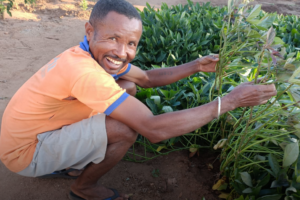Potatoes are an important crop in Africa, particularly in countries like Kenya, Rwanda, and Uganda, where they are a significant source of income for smallholder farmers. However, potato yields in the region could be higher, with many farmers needing help to produce enough to meet their needs and sell to markets.
The International Potato Center (CIP) has partnered with Plant Village, an agriculture data platform that acts like a virtual extension agent, providing farmers with tailored information and real-time advice on growing and managing their crops. CIP provides data from it’s mobil app Nuro. The partnership will help them to increase their potato production, a staple food source of income for many families in Africa, which in turn will improve agro economics across the continent. The app, available for free download, offers information on weather patterns, soil health, pest outbreaks, and advice on crop management and post-harvest handling.
“In areas where extension services are limited like Kenya, farmers often lack knowledge about different plant diseases affecting their crops,” said Mathew Korir, part of Plant Village in Kenya.
“This app fills this gap by helping farmers to learn about various disease symptoms. Using the app, they can easily differentiate between diseases and receive accurate management and control information.”
To access more specific advice, farmers can upload photos of their crops and receive customized advice on managing any issues they are experiencing. The app also includes a feature that allows farmers to connect with buyers and markets, helping them to sell their produce directly and earn better prices.
“In one instance, a group of farmers learned to diagnose late blight in their potato plants by using the app,” said Korir. “This was a new concept for them since they couldn’t differentiate between early and late blight symptoms. We trained them how to use it to get recommendations on immediate control measures like removing and burying affected plants to prevent disease spread.”
CIP provides technical support and expertise to the partnership, drawing on its extensive experience in potato research and development.





